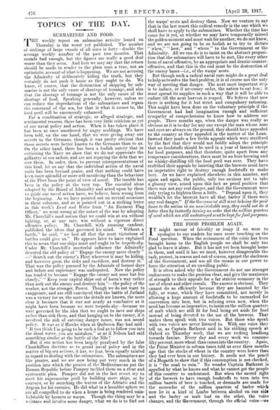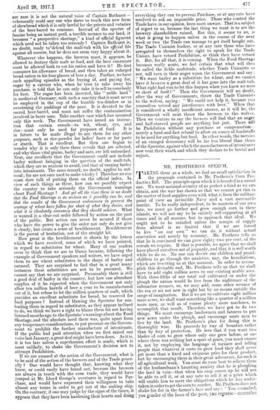THE FOOD PROBLEM AGAIN.
IT might savour of frivolity or irony if we were to apologize to our readers for once more touching on the Food question. When the seriousness of the crisis has been brought home to the English people we shall be only too glad to leave it alone. But it has not yet been brought home to them, and until it has we must, however disagreeable the task, protest, in season and out of season, against the slackness of the Government, and use all the means in our power to force the attention of an unwilling public.
It is often asked why the Government do not use stronger endeavours to make the position clear, and give the maximum of strength to their appeals for a far stricter economy in the use of wheat and other cereals. The answer is obvious. They cannot do so efficiently because they are haunted by the folly, or worse, which they have committed, not merely in allowing a huge amount of foodstuffs to be earmarked for conversion into beer, but in refusing even now, when the need has become so imperative, to insist on the million quarters of malt which are still fit for food being set aside for food instead of being devoted to the use of the brewers. That makes them speak with two voices. But those who speak with two voices are never listened to. With one voice they tell us, as Captain Bathurst said in his striking speech at Oxford on Thursday week, that we are rushing headlong towards famine. Every day and every week we consume fifty per cent. more wheat than comes into the country. Again, the Prime Minister in solemn tones told us over three months ago that the stocks of wheat in the country were lower than they had ever been in oar history. It needs not the pencil of a Hogarth to show that if this consumption is not checked, it is "the road to ruin." No wonder Captain Bathurst is appalled by what he knows and what he cannot get the people of this country to understand. But when the sacred right of the brewers to have enough foodstuffs to turn into ten million barrels of beer is touched, or demands are made for the surrender of the million quarters of barley which now lie in a kind of Limbo between alcohol on one side and the barley or malt loaf on the other, the voice chances, and the Government, through the official voice—we are sure it is not the natural voice of Captain Bathurst— vehemently scold any one who dares to touch this new form of shewbread which it is only lawful for the priests and votaries of the beer-barrel to consume. Instead of the spectre of famine being an instant peril, a terrible menace to our land, it becomes "a prospective shortage," a kind of official figment which need not be taken too seriously ! Captain Bathurst is, no doubt, ready to'clefend the malt-tub with his official life against all comers, but he does not seem very happy about it.
Whatever else happens, the brewers must, it appears, be allowed to destroy their malt as food, and the beer consumer must be allowed both to cat his ration and have it ! He first consumes his allowance of bread, and then takes, an enlarged bread ration in his four glasses of beer a day. Further, we have such appalling episodes as the buying of, and paying for, sugar by a caterer who, when he tries to take away his purchase, is told that he can only take it to sell to somebody for beer. The sugar has been invested, like "noble land" in mediaeval Germany, with such a sanctity that it must never be employed in the cup of the humble tea-drinker or in sweetening the puddings of the poor. It is devoted to the sacred beer-barrel, and must not suffer the contamination involved in baser uses. Take another case which has occurred only this week. The Government have issued an instruc- tion that certain cereals—to wit, wheat, rye, and rice—must only be used for purposes of food. It is in future to be made illegal to use them for any other purposes, such as rice-powder for ladies' faces or for paste or starch. That is excellent. But then one begins to wonder why it is only these three cereals that are selected, and why those vital grains, barley and oats, are left untouched. Next, one recollects that the Government could not include barley without bringing in the question of the malt-tub, which they are so anxious to avoid, and that of turning barley into intoxicants. The same remark, no doubt, applies to oat- meal ; for are not oats used to make whisky ? Therefore no one must dare talk of putting them on the official index. In view of such things as these, how can we possibly expect the country to take seriously the Government warnings about Food Shortage ? And yet all the time there is no doubt that the Food Shortage is as serious as it possibly can be, and that the results of the Government endeavours to prevent the wastage of wheat have fallen far short of what they desire, and what it is absolutely necessary that they shozdd achieve. What is wanted is a clear-cut order followed by action on the part of the public. But action can never be secured if those who have the power to give the order not only do not give it clearly, but create a sense of bewilderment. Bewilderment is the parent of hesitation, not of the straight hit. How great is the bewilderment is shown by the letters which we have received, some of which we have printed, in regard to substitutes for wheat. Many of our readers seem to think that we are to blame because, following the example of Government speakers and writers, we have urged them to use wheat substitutes in the shape of barley and oatmeal. They are surprised to find that in a great many instances these substitutes are not to be procured. We cannot say that we are surprised. Presumably there is still a good deal of barley in the country, but how can abundant supplies of it be expected when the Government not only allow ten million barrels of beer a year to be manufactured out of it, but refuse to let the million quarters of malt, which provides an excellent substitute for bread, be reserved for food purposes ? Instead of blaming the Spectator for mis- leading them in regard to substitutes, as they appear inclined to do, we think we have a right to blame them for not having listened months ago to the Spectator's warnings about the Food Shortage, and the absolute need there was, quite apart from any temperance considerations, to put pressure on the Govern- ment to prohibit the further manufacture of intoxicants. If the public had paid attention when we first raised our voice last January, a great deal might have been done. As it is, it is too late unless a superhuman effort is made, which is most unlikely, to shake the Government's decision not to attempt Prohibition. If we are amazed at the action of the Government, what is to be said 9f the action of the brewers and of the Trade gener- ally? One would have thought that, knowing what they know, or could easily have found out, because the brewers are always in touch with the corn trade, they would have jumped at Mr. Lloyd George's overtures in regard to Pur- chase, and would have expressed their willingness to take almost any terms in order to get out of the sinking ship. On,the contrary, if one May judge by the signs of the times, it appears that they have been hardening their hearts and doing everything they can to prevent Purchase, or at -any rate have resolved to ask an impossible price. Those who control the Trade have, in our opinion, been most unwise. That is a subject of regret to us, because the last thing we want is to see the brewery shareholders ruined. But this, it seems to us, is what is going to happen unless in the course of the next week or two the Trade can manage to get itself bought out. The Trade Unionist leaders, or at any rate those who have arrogated to themselves the right to speak for the Trade Unions, have vetoed Prohibition, or think they have vetoed it. But, for all that, it is coming. When the Food Shortage becomes really acute, we feel certain that what will then be called the fickle multitude, whether Trade Unionists or not, will turn in their anger upon the Government and say : "We want barley as a substitute for wheat, and we cannot have it because a great deal of it has gone into the malt-tub. What right had you to let this happen when you knew we were so short of food ? " Then the Government will no doubt, after the way of Governments, throw the Trade Unionists to the wolves, saying : "We could not help it, because you yourselves vetoed any interference with beer." When that is considered a wholly insufficient answer, as it will be, the Government will next throw the brewers to the wolves. Then we venture to say the brewers will find that an angry and half-starved people are anything but just. There will be Prohibition without any purchase or compensation— merely a hard-and-fast refusal to allow an ounce of foodstuffs to be used for anything but food. In oth er words, the mercies of an enraged democracy will be far less liberal than those of the Spectator, against which the manufacturers of intoxicants now vent their wrath and which they declare to be brutal and unjust.



































 Previous page
Previous page